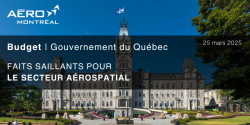Quebec Budget 2025–2026
Supporting Innovation to Boost Competitiveness
For immediate release – Press release

Montréal, March 25, 2025 – Aéro Montréal takes note of the 2025–2026 budget presented today by the Government of Québec and welcomes the measures aimed at supporting businesses in a global context marked by trade uncertainties. The implementation of the new innovation tax credit program will provide stability, enhance productivity, and help companies stand out in a highly competitive environment. However, Aéro Montréal regrets the absence of specific measures addressing the retention of strategic jobs.
A manufacturing sector facing tariff challenges
Québec’s aerospace industry, deeply integrated into North American supply chains, is increasingly facing challenges linked to trade relations with the United States.
“Aéro Montréal welcomes the government’s effort to support companies in a context where U.S. trade policies are evolving rapidly. The cluster stands ready to work with the government to adapt these measures to an industry that will need targeted support to navigate this complexity and remain competitive,” said Mélanie Lussier, President and CEO of Aéro Montréal.
Key highlights of the 2025–2026 Budget:
- $4.1B to strengthen the competitive position of Québec businesses. Financial assistance in the form of loans for companies facing liquidity challenges; support for exporting companies through Revenu Québec; and an extension of accelerated depreciation measures. $900M over 3 years to support business projects in automation, robotics, digital transformation, and AI integration. Continuation of the Digital Transformation Offensive with $14M over 3 years to help companies improve productivity. $15.8M over 2 years to support export projects and $30M over 5 years to strengthen Québec’s international representation.
- $604.1M to boost innovation capacity and commercialization. Creation of a new, optimized innovation tax credit program (totaling $271.5M over 5 years) through an enhanced tax credit for research, innovation, and commercialization (CRIC). $15M over 3 years to support collaborative research and technology transfer, accelerating the adoption of cutting-edge technologies in industries such as aerospace.
- $42.3M over 3 years to support high-potential SMEs, through the launch of the SME Plan 2025–2028, providing access to services and support across all regions of Québec.
Innovation at the heart of competitiveness: a new tax framework
The 2025–2026 budget highlights the simplification of the innovation tax system through the introduction of the new Research, Innovation and Commercialization Tax Credit (CRIC).
“Innovation is the main lever to tackle competitiveness challenges, and it lies at the very heart of our sector: Québec accounts for nearly 70% of Canada’s aerospace R&D. This expanded and enhanced fiscal framework is a step in the right direction to help our members differentiate themselves on the international stage,” emphasized the President and CEO of Aéro Montréal.
Workforce policy predictability: an urgent issue for our industry
Aéro Montréal also stresses the critical importance of predictable access to a qualified workforce. The organization remains concerned about the ongoing labor shortage, which continues to weigh heavily on the sector.
In the face of both U.S. tariff pressures and a persistent shortage of skilled workers, Aéro Montréal reiterates its call for a moratorium on restrictions imposed on the Temporary Foreign Worker Program (TFWP) since fall 2024. As Québec’s leading manufacturing industry, with 41,700 jobs and projected needs of 41,500 new workers over the next decade, the aerospace sector cannot afford to lose highly skilled foreign workers. “We want to work closely with the government to develop concrete solutions to attract, train, and retain the talent our industry urgently needs to maintain its position as a global leader.”
About Aéro Montréal
Created in 2006, Aéro Montréal is a strategic think tank that brings together the top leaders of Québec’s aerospace sector, including industry, educational institutions, research centers, associations, and unions.
Its activities are made possible thanks to the participation of the Governments of Canada and Québec, the Montréal Metropolitan Community, and the member companies of the cluster.
SOURCE: Aéro Montréal
Media contact:
Léa Guicheteau
Aéro Montréal
514-550-7494
lea.guicheteau@aeromontreal.ca
